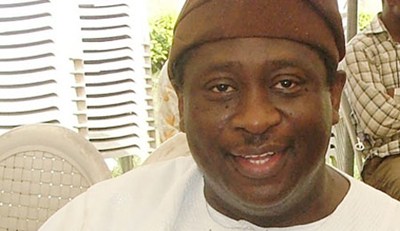
Less than 24 hours after it declared Wale Babalakin, the billionaire lawyer, wanted, the Economic and Financial Crimes Commission, told a Lagos High Court that it had no reason to oppose the businessman’s bail.
The EFCC spokesperson, Wilson Uwujaren, had on Wednesday evening, released a statement declaring Mr. Babalakin wanted and alleging that the lawyer was on the run. The anti-graft commission appealed to Nigerians to report to its offices or any police station the sighting of Mr. Babalakin.
Less than 24 hours after the EFCC released the statement, its lawyer, Rotimi Jacobs, told the Lagos Court that he was not opposed to Mr. Babalakin’s bail as his client, the EFCC, had no reason to.
The charges
Mr. Babalakin and his co-accused, Alex Okoh, are accused by the EFCC of criminal conspiracy and money laundering amounting to N4.7 billion.
The 27-count charge includes accusation of a N1.3 billion corrupt enrichment involving Mr. Babalakin, Stabilini Visioni Limited, and Bi-Courtney Limited transferred to Erin Aviation, Mauritius, for the purchase of Challenger Jet Aircraft for James Ibori, convicted former Delta State governor.
The anti graft commission also accused the duo of retention of the proceeds of a criminal conduct.
Other firms allegedly used as conduits in the multi-billion dollar fraud include Interactive Technologies/TN Focus, Supetrol Oil and Gas Limited, Casaka Nigeria Company Limited, Geofluids Limited and Hyundai Heavy Industries (Nig.) Company Limited.
Both men pleaded not guilty to all the charges.
The bail
The Lagos High Court sitting in Ikeja granted Mr. Babalakin bail based on self recognition.
Mr. Babalakin’s co-accused, Alex Okoh, was also granted bail by Justice Adeniyi Onigbanjo on the same term.
Mr. Onigbanjo, however, insisted that the duo must deposit their international passports as “a precautionary measure.”
“The court is aware of all the considerations cited and it is aware of the status of the defendants in the country. The defendant is hereby granted bail on the basis of self-recognition,” Mr. Onigbanjo said.
“But as a precautionary measure, the defendant must deposit his travel passport with the EFCC (Economic and Financial Crimes Commission) and on no account should it be released to him without an express permission of this court,” he added.
A sensational build up
Thursday’s arraignment enjoyed a sensational build-up after the EFCC on Wednesday evening declared Mr. Babalakin, a Senior Advocate of Nigeria (SAN), wanted.
At exactly 10.04 a.m. Thursday morning, Mr. Babalakin, sporting a striped navy-blue suit on a white shirt, arrived in a Mercedes Jeep and walked into an overcrowded court room.
Unlike the two previous drama-filled sittings in which Mr. Babalakin failed to turn up, Thursday’s proceedings were devoid of heated exchanges between the prosecution and defense counsels.
Olawale Akoni, SAN, had urged the court to grant his client, Mr. Babalakin, bail on his recognition as a member of Body of Benchers; the Pro-Chancellor of the University of Maiduguri, the Chairman, as well as the Forum of Pro-Chancellors of Nigerian Federal Universities.
Rotimi Jacobs, counsel to the EFCC, did not oppose the defendants’ application for bail.
All through the proceedings, Mr. Babalakin, between occasional yawns and acknowledging greetings from lawyers at the bar, sat, blank-faced, in the dock.
While striking out a second application by Mr. Babalakin’s counsel to adjourn the matter indefinitely, the judge fixed February 25 for hearing of the application to quash the charges.
“All defense counsels must have filed their interlocutory application within 14 days with their written addresses attached,” said Mr. Onigbanjo.
A confused EFCC
Speaking with journalists after the court’s proceedings, Mr. Babalakin described his trial as “epoch-making.”
“Epoch-making in the sense that a massive machination that is difficult to reconcile with facts,” Mr. Babalakin said.
“Yesterday the EFCC declared me wanted, today the EFCC counsel said that I have complied with all bail terms. So obviously, the declaration is a figment of the EFCC’s imagination. It has no factual basis,” he added.
There was no explanation by the EFCC as to why they declared Mr. Babalakin wanted on the eve of the arraignment.
In an apparent show of confusion within the administration of the anti-graft agency, Mr. Jacobs said that he knew nothing about the declaration.
“I don’t know what happened outside court, it’s what happened in court that I can answer,” he said.
On why he did not oppose the defendants’ bail application, Mr. Jacobs said that they complied with the terms of the earlier bail granted them.
“Where somebody had been granted bail three times administratively and today we allowed him to walk into the court, so what are we going to say?
“We did not bring him to court, he came on his own, then what moral
justification do I have to then oppose bail?” he said.
justification do I have to then oppose bail?” he said.
My arguments will be very dry if my client released him on bail and then I’m asking the court to detain him. That is why I did not oppose it,” said Mr. Jacobs.
Mr. Akoni said that the charges against his client were “trumped up.”
“Nothing is going to come out of this because there is absolutely no shred of evidence connecting the first defendant to this case. We will show it in court. This is not the first time they will file things like this,” Mr.
Akoni said.
Akoni said.
Source: Premium Times
No comments:
Post a Comment